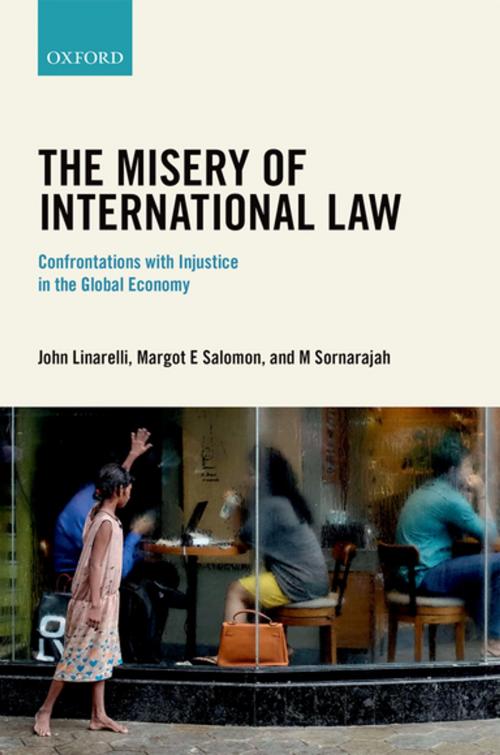The Misery of International Law
Confrontations with Injustice in the Global Economy
Nonfiction, Reference & Language, Law, International, Legal History| Author: | John Linarelli, Margot E Salomon, Muthucumaraswamy Sornarajah | ISBN: | 9780191068713 |
| Publisher: | OUP Oxford | Publication: | March 23, 2018 |
| Imprint: | OUP Oxford | Language: | English |
| Author: | John Linarelli, Margot E Salomon, Muthucumaraswamy Sornarajah |
| ISBN: | 9780191068713 |
| Publisher: | OUP Oxford |
| Publication: | March 23, 2018 |
| Imprint: | OUP Oxford |
| Language: | English |
Poverty, inequality, and dispossession accompany economic globalization. Bringing together three international law scholars, this book addresses how international law and its regimes of trade, investment, finance, as well as human rights, are implicated in the construction of misery, and how international law is producing, reproducing, and embedding injustice and narrowing the alternatives that might really serve humanity. Adopting a pluralist approach, the authors confront the unconscionable dimensions of the global economic order, the false premises upon which they are built, and the role of international law in constituting and sustaining them. Combining insights from radical critiques, political philosophy, history, and critical development studies, the book explores the pathologies at work in international economic law today. International law must abide by the requirements of justice if it is to make a call for compliance with it, but this work claims it drastically fails do so. In a legal order structured around neoliberal ideologies rather than principles of justice, every state can and does grab what it can in the economic sphere on the basis of power and interest, legally so and under colour of law. This book examines how international law on trade and foreign investment and the law and norms on global finance has been shaped to benefit the rich and powerful at the expense of others. It studies how a set of principles, in the form of a New International Economic Order (NIEO), that could have laid the groundwork for a more inclusive international law without even disrupting its market-orientation, were nonetheless undermined. As for international human rights law, it is under the terms of global capitalism that human rights operate. Before we can understand how human rights can create more just societies, we must first expose the ways in which they reflect capitalist society and how they assist in reproducing the underlying terms of immiseration that will continue to create the need for human rights protection. This book challenges conventional justifications of economic globalization and eschews false choices. It is not about whether one is "for" or "against" international trade, foreign investment, or global finance. The issue is to resolve how, if we are to engage in trade, investment, and finance, we do so in a manner that is accountable to persons whose lives are affected by international law. The deployment of human rights for their part must be considered against the ubiquity of neoliberal globalization under law, and not merely as a discrete, benevolent response to it.
Poverty, inequality, and dispossession accompany economic globalization. Bringing together three international law scholars, this book addresses how international law and its regimes of trade, investment, finance, as well as human rights, are implicated in the construction of misery, and how international law is producing, reproducing, and embedding injustice and narrowing the alternatives that might really serve humanity. Adopting a pluralist approach, the authors confront the unconscionable dimensions of the global economic order, the false premises upon which they are built, and the role of international law in constituting and sustaining them. Combining insights from radical critiques, political philosophy, history, and critical development studies, the book explores the pathologies at work in international economic law today. International law must abide by the requirements of justice if it is to make a call for compliance with it, but this work claims it drastically fails do so. In a legal order structured around neoliberal ideologies rather than principles of justice, every state can and does grab what it can in the economic sphere on the basis of power and interest, legally so and under colour of law. This book examines how international law on trade and foreign investment and the law and norms on global finance has been shaped to benefit the rich and powerful at the expense of others. It studies how a set of principles, in the form of a New International Economic Order (NIEO), that could have laid the groundwork for a more inclusive international law without even disrupting its market-orientation, were nonetheless undermined. As for international human rights law, it is under the terms of global capitalism that human rights operate. Before we can understand how human rights can create more just societies, we must first expose the ways in which they reflect capitalist society and how they assist in reproducing the underlying terms of immiseration that will continue to create the need for human rights protection. This book challenges conventional justifications of economic globalization and eschews false choices. It is not about whether one is "for" or "against" international trade, foreign investment, or global finance. The issue is to resolve how, if we are to engage in trade, investment, and finance, we do so in a manner that is accountable to persons whose lives are affected by international law. The deployment of human rights for their part must be considered against the ubiquity of neoliberal globalization under law, and not merely as a discrete, benevolent response to it.















